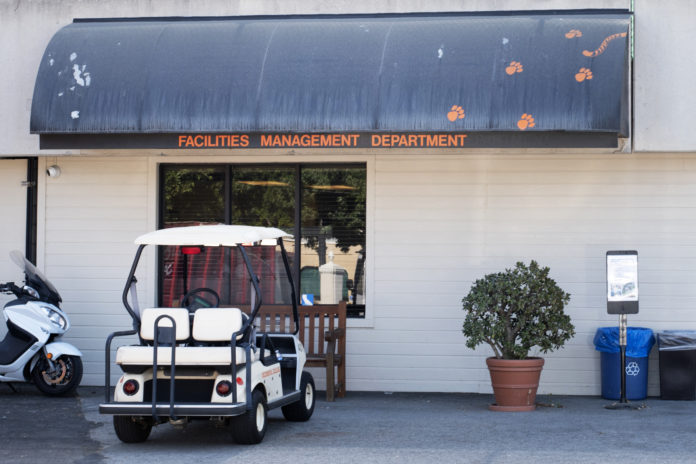
Understaffing in Facilities results in challenges for staff and management, according to Facilities employees. The Facilities Management department includes cleaning services, grounds maintenance, stockroom, utilities and building maintenance and other areas. Vacancies and budget constraints lead to strain on workers and challenges completing work, according to employees.
The grounds department is responsible for landscaping, irrigation, athletic field maintenance and trash and recyclables pickup. Grounds currently has 10 full-time employees, including one person on paternity leave, and is in the process of hiring for three vacant positions, according to Grounds Manager Lola Trafecanty.
Since Summer 2019, two employees were promoted to fill the positions left by three grounds employees who had retired, leaving three positions currently unfilled. One temporary employee works for grounds as it carries out the process of permanent hiring.
In 1991, grounds had 23 employees, according to a document obtained from a former Facilities employee. In May 2018, grounds had 12 employees.
William Roman, HVAC helper and former cleaning services employee once responsible for cleaning Fowler Hall, said the work in cleaning services gets done at a cost. He said staff often get injured from repetitive motions and employees are unable to thoroughly clean buildings in the time allotted.
“I know at some points management [does] try, [does] make an effort actually, to generate positions. On the other hand, I feel sometimes management, because of pressure and convenience, they can say, ‘Oh, no, we can do it. We can handle it with the people we have,’ yet [it comes] at the risk of the employees,” Roman said.

Associate Vice President of Facilities Tom Polansky said that while he receives requests for more staff in every area, Facilities is currently hiring only to fill positions made vacant by retirements.
“It’s generally been OK. I mean, just to be clear, budget’s generally been set about right — about at the right levels for the size campus we have,” Polansky said.
According to Polansky, the Facilities budget has remained about the same since he started working at Occidental in 2013.
Miguel Aguilar, grounds employee and lead who has worked at Occidental since 1997, said that the number of grounds staff presents challenges. As a lead, Aguilar acts as a team leader and directs contractors when Trafecanty, his supervisor, is not in, including Fridays when she does not work. Aguilar says he must regularly make decisions about what work to prioritize when there is too much to do.
“There are some times that we are real short and a lot of people call in sick. I have to figure out how to do the work or see what is more important things to do. There are more important things to do, I choose to not do something that [Trafecanty] had asked for, and then I have to tell her the next time I see her,” Aguilar said.
Some work does not get done. Workers are unable to maintain shrubs and other plants around campus, and the lines on the soccer and softball fields remain unpainted or the grass is unmowed, according to Aguilar.
When Aguilar was promoted to lead, he was unable to continue the work he previously did as an irrigation specialist. Now, one irrigation specialist, Jesse Montanez, does the entirety of irrigation work.
“In the past, they usually hired a student for us — two or three students. Not anymore,” Aguilar said.
Employees and supervisors in grounds are tasked with balancing their regular maintenance work and project work, such as responding to unforeseen circumstances and conducting preventative maintenance, according to Trafecanty, Polansky and Aguilar.
Employees in grounds often are called to deal with unexpected events, according to Aguilar. In 2017 Aguilar was one of the first responders to a fire on Mount Fiji, for which he later received an award.
“For everything that is outside, they call grounds . . . We do the work, maybe with some stress because it’s not our responsibility, but we do the work,” Aguilar said. “Even in the past, they called grounds to take a dead rat from inside the buildings. They sent us to take a dead possum, a dead animal from under the houses. To put traps for skunks, whatever, everything is for grounds.”
The budget limits the number of workers that can be hired, according to Trafecanty.
“Sure, if they said, ‘You can have three more individuals,’ everybody would be jumping for joy, but at what cost?” Trafecanty said. “If each department got three more people, how much does that cost the college? Because it’s not just the rate they’re being paid, it’s also the benefits. We have great benefits for staff that need to be calculated.”
Trafecanty worked at Scripps College before she started working at Occidental this Fall 2019. She said a pattern of being busy and needing to prioritize tasks is common in higher education.
“It’s about how you set everything up and build the relationships that help, even within the team, to support each other,” Trafecanty said. “That’s how I compensate for where I feel, ‘Oh my gosh, we have all this to do this week, how are we going to manage?’ Well, this is how we’re going to manage, we’re going to work together.”
Similar problems with workload allocation persist in cleaning services as well, where the amount of work allocated to one employee per shift is based on square footage, according to Gabriella Rodriguez (sophomore), labor liaison on Diversity and Equity Board (DEB) and a former student worker in Facilities. Roman said this leaves some employees with more space to clean than they can do well.
“It’s impossible,” Roman said. “You have to have a blend of logistics and the actual time it takes to clean — experience. It’s not the same. When you do something and you think it’s going to take you 15 [minutes] and you go to do it and it takes you 20, 25, it’s not the same. And that’s one of the big flaws that my management department might have: the time allocating for buildings or the proper restructuring of routes.”
Cleaning services management has implemented some changes to reduce the workload on workers, Roman said. When Roman cleaned Fowler Hall, he was told to take the trash out only three days a week as opposed to every shift, although he made the decision to do it every day anyway. One position was added in cleaning services following student protests in Spring 2018. Cleaning services plans to hire another half-time employee to assist in cleaning the new De Mandel Aquatic Center, according to Polansky.
“One of the things that I found out at least with most of my cleaning services colleagues is that a lot of them love their job. They love what they do, they become masters of their craft — they love to clean. They take it very personal to the point that the ladies, I call them the ladies sometimes, call the students ‘my kids,’” Roman said. “You don’t use that kind of language if it doesn’t mean anything to you. It means something to them.”
![]()






























